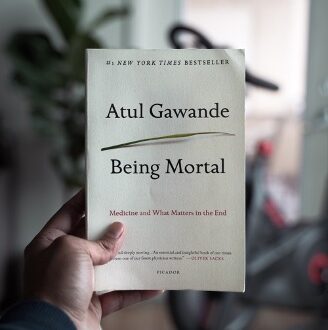
The Body Keeps the Score: Book Review
Every now and then, a book comes your way that simply forces you to think and, better still, reconsider several of your preconceptions. Bessel van der Kolk’s The Body Keeps the Score is one such book. It takes a deep dive into the murky waters of trauma and how it can shape our lives in ways we never imagined.
But it’s not all doom and gloom – van der Kolk also offers hope for healing through mindfulness, supportive relationships, and remarkable therapeutic methods like yoga and EMDR – a psychotherapy approach that uses guided eye movements to facilitate the reprocessing of traumatic memories and reduce their emotional intensity.
Author background
Bessel van der Kolk, MD, is a pioneering psychiatrist and trauma expert whose groundbreaking research has influenced the field of trauma studies and therapy. With decades of experience and an empathetic approach, he has dedicated his career to understanding the complexities of trauma and exploring innovative methods to help survivors reclaim their lives.
Who is it for?
The Body Keeps the Score is an invaluable resource for anyone interested in understanding trauma and its effects on the mind and body.
On the one hand, mental health professionals – including therapists, counsellors, and psychiatrists – can benefit significantly from the book’s insights into innovative treatment methods and the science behind trauma. On the other, trauma survivors seeking guidance and hope for their healing journey will find solace in the book’s empathetic approach, relatable case studies, and practical recommendations for recovery.
Moreover, the general public – including friends and family members of trauma survivors –can gain a deeper understanding of the complexities involved in trauma, enabling them to offer support and empathy to their loved ones.
Finally, educators, policymakers, and social workers may also appreciate the book’s comprehensive overview of trauma and its far-reaching consequences, informing their efforts to create safe and supportive environments for individuals affected by trauma.
SWOT ANALYSIS OF THE BOOK
| In The Body Keeps the Score, Bessel van der Kolk takes an innovative and comprehensive approach to understanding the profound impact of trauma on the mind and body. Through his analysis of the nature and causes of trauma and its effects on individuals, he offers practical solutions and hope for healing through techniques like EMDR, yoga, and neurofeedback. While the book’s technical language and focus on individual therapy may be challenging for some readers, it can inspire further research and innovation in trauma studies and therapy, particularly as post-covid society becomes increasingly interested in such topics. However, the book may face competition from other resources in the field. Some of the author’s insights and approaches may be controversial or provoke disagreement among readers, which could limit its impact. |
Key insights from The Body Keeps the Score include:
- Trauma is ubiquitous, impacting the lives of war veterans and individuals who have endured varying degrees of violence and abuse.
- Trust is delicate and quickly shattered for those who have experienced trauma, leading to strained relationships and a sense of isolation.
- Flashbacks are relentless, forcing survivors to relive their trauma, often blurring the lines between memories and the present.
- The remnants of childhood trauma persist into adulthood, shaping thought patterns and giving rise to physical and emotional afflictions.
- Traumatic memories are vivid and unyielding, making it challenging to move beyond the past.
- Establishing trust and rapport with someone suffering from Post-Traumatic Stress Disorder (PTSD) is a difficult yet crucial step towards healing.
- EMDR is transformative, enabling patients to process their memories and regain control over their lives.
- The strength of EMDR lies in its ability to help survivors restructure their memories, granting them agency and the opportunity for a brighter future.
- Yoga provides a sanctuary for those grappling with trauma, allowing them to explore the interconnectedness of their body and mind.
- Mindfulness and supportive relationships form the foundation of trauma recovery, fostering emotional awareness and a reliable support system.
- Neurofeedback is a game-changer, assisting trauma survivors in rewiring their brains and finding solace in relaxation and tranquillity.
- Research indicates that trauma alters brain waves, leading to relaxation, focus, and emotional regulation challenges.
- Through neurofeedback, patients can observe their brain waves in real-time, consciously making efforts to relax and regulate emotions.
- Neurofeedback allows trauma survivors to process their experiences and develop healthier coping strategies.
Limitations
Despite The Body Keeps the Score’s numerous strengths, some limitations and criticisms are worth noting. Some readers have found that the book needs to provide a comprehensive discussion of alternative therapeutic approaches, as it currently lacks a comprehensive list of available treatments.
Additionally, the book has been criticised for not delving deeply into the cultural aspects of trauma, potentially neglecting the unique experiences of individuals from diverse backgrounds. Furthermore, the book’s dense content and scientific jargon may be challenging for some readers, especially those without a professional mental background.
| Further Reading: https://www.goodreads.com/en/book/show/18693771 |
What Makes The Body Keeps the Score Stand Out in the Landscape of Trauma Literature?
The Body Keeps the Score holds a significant place within the broader landscape of trauma literature. While there are other books that discuss trauma and healing, such as Judith Herman’s Trauma and Recovery and Peter Levine’s Waking the Tiger, Bessel van der Kolk’s work stands out for its focus on the interplay between the mind, brain, and body in the transformation of trauma.
The book contributes to the ongoing conversation around trauma and healing by presenting cutting-edge research, offering a comprehensive understanding of the effects of trauma, and emphasising the importance of innovative treatment methods. By building on the foundation laid by earlier works, The Body Keeps the Score advances our knowledge and fosters a deeper empathy for trauma survivors, ultimately contributing to a more compassionate and effective approach to healing.
Trauma and Healing in India: Uncovering the Relevance of Timeless Practices
In a land steeped in a rich tapestry of history, India bears witness to the indelible marks of communal discord, cataclysmic natural disasters, and the harrowing reality of gender-based violence. Survivors of events like the 2002 Gujarat riots, the 2004 Indian Ocean tsunami, or the untold stories of women enduring domestic abuse could find solace in the therapeutic techniques unravelled within the pages of this book.
The ancient wisdom of yoga, deeply rooted in Indian tradition, weaves a profound connection between body and mind, illustrating the book’s relevance to the culture it hails from. As we confront the ever-growing mental health challenge in the nation, it becomes imperative to delve into the labyrinth of trauma and its far-reaching consequences. Through this lens, we can begin to understand and heal the fractures within the fabric of our society, fostering resilience and unity.
Overall, this book is a game-changer for anyone interested in mental health and the power of the mind-body connection.


